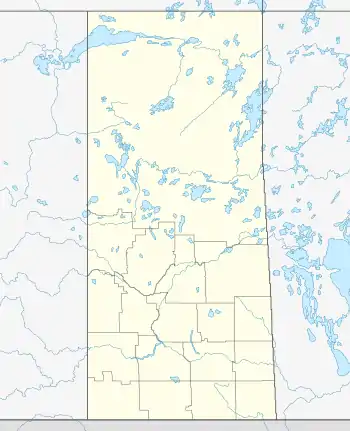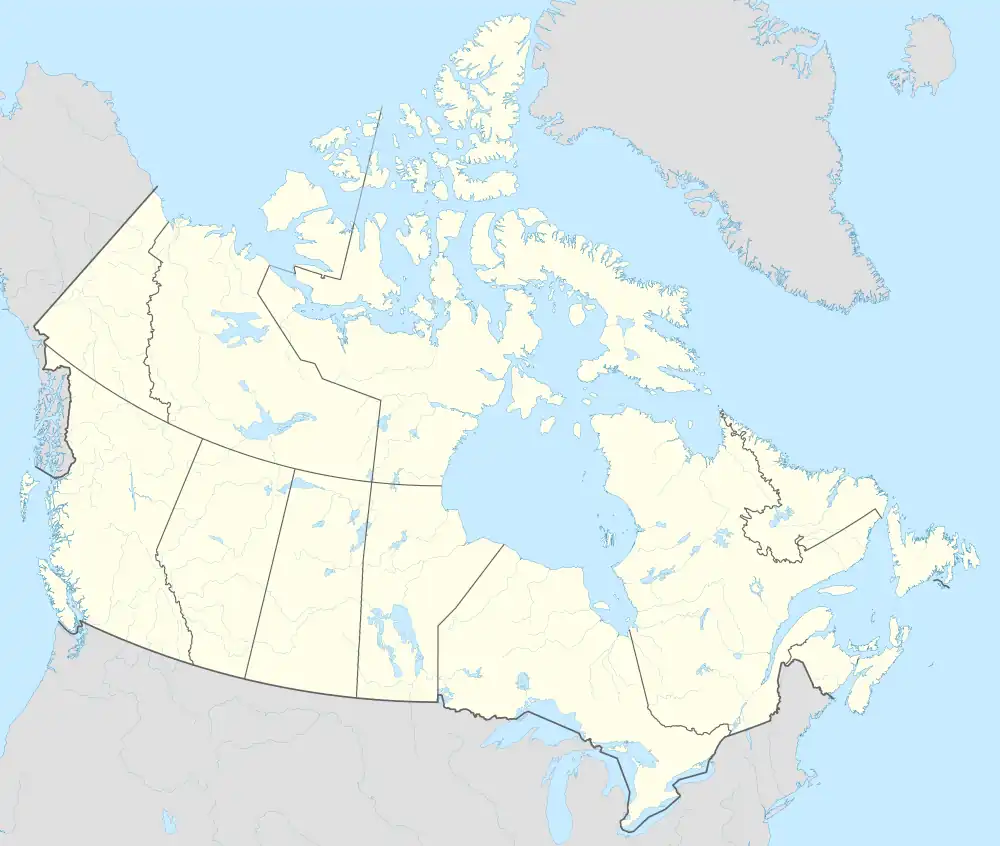Wood Mountain Post Provincial Park
Wood Mountain Post Provincial Park[1] is a 5.48-hectare historical provincial park in the Canadian province of Saskatchewan. The site was designated an historic site in the 1960s and became a provincial park in 1986.[2] Originally, it was the location of a North-West Mounted Police (NWMP) post that operated from 1887 to 1918. The post was established to develop relations with local Indians, patrol the Canada–United States border, and to perform general policing duties.
| Wood Mountain Post Provincial Park | |
|---|---|
 Location of Wood Mountain Post Provincial Park in Saskatchewan  Wood Mountain Post Provincial Park (Canada) | |
| Location | RM of Old Post No. 43, |
| Coordinates | 49.3158°N 106.3789°W |
| Current use | Historic site |
| Governing body | Saskatchewan Parks |
| Owner | |
| Official name | Wood Mountain Post Provincial Historic Park |
| Designated | 1986 |
Wood Mountain Post Provincial Park is located in the RM of Old Post No. 43 along Highway 18, about 8 kilometres (5.0 mi) south of the village of Wood Mountain and 35 kilometres (22 mi) north of the Canada–United States border. It is in the Wood Mountain Hills, adjacent to Wood Mountain Creek (which is a tributary of Wood River via Lynthorpe Creek)[3] and Wood Mountain Regional Park. The provincial park has a picnic area and the neighbouring regional park has a campground.[4]
History
In 1874, the North-West Mounted Police marched west to deal with the Cypress Hills Massacre. Along the route was a depot in the Wood Mountain Hills that was used by the Boundary Commission when the Canada–United States border was surveyed. The NWMP used that depot intermittently from 1874 until 1887 to police whisky traders, horse thieves, and cattle rustlers. In 1876, Chief Sitting Bull and 5,000 members of the Lakota Sioux took refuge at the post after the Battle of the Little Bighorn in the Montana Territory of the United States. They remained in the area for five years before Chief Sitting Bull and many of them returned to the US. The First Nations that remained in Saskatchewan make up the present-day Wood Mountain Lakota First Nation. Wood Mountain Post was closed in 1883 and then re-opened in 1885 with the out-break of the North-West Rebellion. Two years later, the dilapidated buildings were abandoned and new buildings were constructed 300 metres (980 ft) to the south-east, across Wood Mountain Creek. This new site is the location of the current provincial park and the original site is the location of Wood Mountain Regional Park. Wood Mountain Post closed for the final time in 1918.[5]
Reconstruction and historical site
In the 1960s, the Wood Mountain Post site was designated an historical site of Canada. Two buildings – a barracks and a kitchen / storehouse – were reconstructed on their original locations and the foundations of other former buildings were outlined. A large number of artefacts have been recovered as well as the locations of cellars and trails. The artefacts and reconstructed buildings tell the story of Major James Walsh of the NWMP and his negotiations with Chief Sitting Bull.[6][7]
See also
References
- "Wood Mountain Post Provincial Park". Canadian Geographical Names Database. Government of Canada. Retrieved 4 October 2022.
- "Provincial Parks". The Encyclopedia of Saskatchewan. University of Regina. Retrieved 4 October 2022.
- "Wood Mountain Creek". Canadian Geographical Names Database. Government of Canada. Retrieved 4 October 2022.
- "Wood Mountain". Regional Parks of Saskatchewan. Saskatchewan Regional Parks. Retrieved 5 October 2022.
- "Attractions". Wood Mountain Park. Wood Mountain Regional Park. Retrieved 5 October 2022.
- "Wood Mountain Post Provincial Historic Park". Tourism Saskatchewan. Government of Saskatchewan. Retrieved 5 October 2022.
- "Wood Mountain Post Provincial Park". Canada's Historic Places. Parks Canada. Retrieved 5 October 2022.